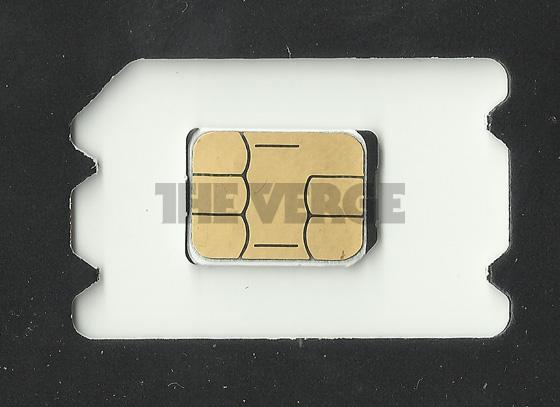Nokia calls Apple nano-sim pledge 'attempt to devalue' competitors' IP
Last updated
Earlier this month, Apple pledged to offer royalty-free licenses to any patents essential to its proposed nano-SIM standard provided the specification is accepted by the European Telecommunications Standards institute (ETSI) and all other patent holders accept the same terms with reciprocity.
However, a Nokia spokesman told IDG that the company is unaware of any essential patents that Apple holds for the proposal.
"In light of this, Apple's proposal for royalty-free licensing seems no more than an attempt to devalue the intellectual property of others," he said.
Photos of prototype versions of Apple's proposed standard emerged on Monday. According to The Verge, Apple's design is "in many ways the least controversial" because it maintains the old configuration of electrical contacts.
Oberthur Technologies' nano-SIM prototype. | Source: The Verge
Nokia also alleges that Apple's proposal does not meet the ETSI's requirements. The handset maker argues that the similarity between the length of Apple's nano-SIM and the width of current-generation micro-SIMs would violate a "no jamming" rule from the standards-setting body.
The ETSI is scheduled to vote on the "fourth form factor (4FF)UICC" proposals on Thursday.
 AppleInsider Staff
AppleInsider Staff








 Amber Neely
Amber Neely
 Thomas Sibilly
Thomas Sibilly

 William Gallagher
William Gallagher
 Malcolm Owen
Malcolm Owen
 Christine McKee
Christine McKee










67 Comments
I don't see Nokia's PoV on this. There design is more squared than Apple's design.
Personally I'd prefer the Nokia SIM only because it's the smallest. RiM's looked appealing at first will all connectors at one end which means it could be further shrunk but then I noticed the 9th contact to the left.
The new nano-SIM might take up less space in a phone, but the current micro-SIM is pretty damn hard to manipulate as it is.
The new nano-SIM might take up less space in a phone, but the current micro-SIM is pretty damn hard to manipulate as it is.
Which is why getting rid of the physical SIM is the way to go for consumers.
The new nano-SIM might take up less space in a phone, but the current micro-SIM is pretty damn hard to manipulate as it is.
Apple should just do away with the sim altogether.
I can't imagine the need for sims anyway. Yah it's convenient to just pop your sim in and out of your phone at the whim of a dime but seriously who even swaps out their sims nowadays?
Why can't they just make a damn phone smart enough to have you input your details.
Just punch in your phone number, punch in your personal access code and the phone will contact the network and provision itself. If you lose the phone, you lose the sim anyway. Once the phone is provisioned that sim is locked, if you want to transfer your sim you just either "hold phone a next to phone b" and do a transfer of account via bluetooth or some other wireless method.
Or just reenter the credentials on phone b and accept the ToS on that device and have the previous device shut off from the network.
I agree that it serves no purpose but to devalue the competition. A cell phone maker should not be the one who standardizes a component that serves to the vital function of the core technology itself.
It should be an outside party who takes input from all carriers to come to an "agreement" as to what should be the standard.
Please don't argue emergency situations because all phones with a sim or not can dial 911 if the phone can communicate on the network band. Even my old deactivated sprint phone still managed to call 911 and I can't even put a sim in it.
Apple should just do away with the sim altogether.
They tried and got shot down. Despite Apple's power in this market there are apparently certain things they can't do.
This is where I disagree. We're only talking about a handful of numbers, but important numbers. This needs to require a PIN to be accessed and needs to be protected from being transmitted via Bluetooth. The time it would take to set up the pairing you could have already copied the numbers over.
Plus, a vSIM might require a low-level entry into some special storage area of the mobile baseband and not directly written via the OS. That's at least one way I might tackle the situation.
It should be an outside party who takes input from all carriers to come to an "agreement" as to what should be the standard.
Yeah, but then Nokia's claims against Apple would also fall on itself and RiM. Personally, I want a phone maker designing the SIM that goes into phones and not the carriers.
Plus, regardless of who creates the design it's still becoming an ETSI standard. There are lots of open and/or free standards created by for-profit companies. Apple does quite a bit of this.